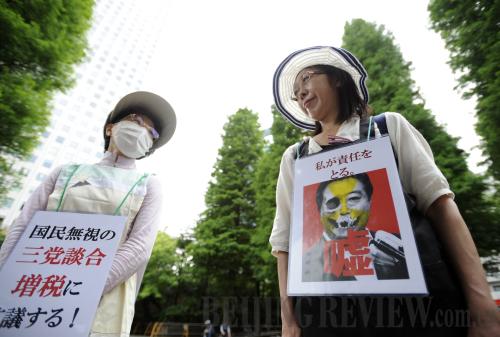|
 |
|
PUBLIC ANGER: Japanese women attend a rally in Tokyo on June 17 against government plans to raise the sales tax and its decision to restart two nuclear reactors at the Oi Nuclear Power Plant (CFP) |
Jin explained that the shrinking European economy will drag down economic growth throughout the world, including developed countries like the United States and emerging economies like China. This will greatly impact a country relying on international trade like Japan. As the euro seriously depreciates, the Japanese yen tends to appreciate, thus decreasing Japan's export competitiveness. Jin added that the turbulent global financial market will also negatively influence the Japanese economy. Plus, a power supply shortage after the earthquake is hurting Japan's productive ability.
However, government expenditures also have added to the country's financial problems. Due to Japan's decreasing birth rate and aging population structure, the country's social burden is getting heavier. For example, statistics show that the Japanese Government spends over 7 trillion yen (about $86 billion) on public services for aged citizens. According to a report from the Japanese Government, the country's public debt will set a new record of 1,000 trillion yen ($12.3 trillion). Its net debt balance will be 120 percent of Japan's GDP. A recent Reuters report said that it's possible the Japanese Government will have run out of money by the end of October this year if the country cannot pass a special bill issuing new national bonds. By then, all governmental expenditures, including salary of governmental employees, pensions and unemployment subsidies, will be at risk.
To solve the urgent need of cutting the financial budget deficit, the Japanese Government must figure out ways to raise revenue. The sales tax hike bill was one attempt to do so as the Japanese Government faces high economic and financial pressure.
Raising the sales tax rate has been a political minefield in Japan. The sales tax bill was adopted in the late 1980s by Noboru Takeshita's cabinet to decrease the rising financial deficit. The original tax rate was 3 percent. In Ryutaro Hashimoto era in the late 1990s, the rate was raised to 5 percent, which directly led to the end of Hashimoto's political career. Noda's government is planning to raise the tax to 8 percent in April 2014, and up to 10 percent by the end of 2015.
The tax hikes have cost the internal unity of the DPJ, which will further destabilize the political situation of Japan. "The split will shake the administration basis of the DPJ, which might cost the DPJ's ruling position in the coming elections," said Hu from the CICIR.
Ozawa is a strong-willed politician, Hu said, so when Noda and the DPJ refused to accept Ozawa's political opinion, Ozawa chose to found a new party. Being an experienced and influential leader, Ozawa had made great contributions to the DPJ's victory three years ago.
Ozawa's departure is likely to cause problems for the DPJ. Previously, the DPJ occupied 289 seats in the lower house, and Ozawa's split decreased the number to its current 251, which exceeds by only 11 seats the majority of the lower house.
| 